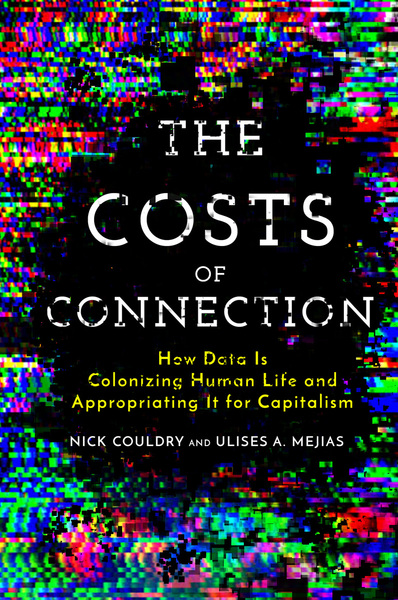Data Colonialism and Its Discontents: Towards A Non-Aligned Technologies Movement
Tuesday, October 13th, 2020

Join us on October 13th @12:30pm for Nick Couldry, Ulises Mejias, and Juan Ortiz Freuler’s discussion, “Data Colonialism and Its Discontents: Towards A Non-Aligned Technologies Movement.”
In their new book, The Costs of Connection: How Data Colonizes Human Life and Appropriates it for Capitalism (Stanford University Press, August 2019), Couldry and Mejias argue that today’s transformations of social life through data must be grasped within the long historical arc of dispossession and extractivism, as both a new colonialism and an extension of capitalism. This new “data colonialism” is based not on the extraction of natural resources or labor, but on the appropriation of human life through data, paving the way for a further stage of capitalism. Resistance requires that we learn from the past, not only in terms of creative new forms of decolonial thinking, but also in terms of a new global movement of resistance that rejects the profit-based or surveillance models of the US and China. One such proposal, presented by Ortiz Freuler and Mejias, is the call for a new Non-Aligned Technologies Movement, which will be discussed during this seminar.

Nick Couldry is a sociologist of media and culture. He is Professor of Media Communications and Social Theory at the London School of Economics and Political Science, and from 2017 has been a Faculty Associate at Harvard’s Berkman Klein Center for Internet and Society. In fall 2018 he was also a Visiting Professor at MIT. He jointly led, with Clemencia Rodriguez, the chapter on media and communications in the 22 chapter 2018 report of the International Panel on social Progress: www.ipsp.org. He is the author or editor of fourteen books including The Mediated Construction of Reality (with Andreas Hepp, Polity, 2016), Media, Society, World: Social Theory and Digital Media Practice (Polity 2012) and Why Voice Matters (Sage 2010). His latest books are The Costs of Connection and Media: Why It Matters (Polity: October 2019). nickcouldry.org
Ulises Ali Mejias is professor of Communication Studies and director of the Institute for Global Engagement at the State University of New York, College at Oswego. He is a media scholar whose work encompasses critical internet studies, network theory and science, philosophy and sociology of technology, and political economy of digital media. He is the author of Off the Network: Disrupting the Digital World (University of Minnesota Press, 2013) and various articles including ‘Disinformation and the Media: The case of Russia and Ukraine’ in Media, Culture and Society (2017, with N. Vokuev), and ‘Liberation Technology and the Arab Spring: From Utopia to Atopia and Beyond’ in Fibreculture (2012). ulisesmejias.com
Juan Ortiz Freuler Juan Ortiz Freuler is a PhD candidate at Annenberg (deferred till January), and an Affiliate at the Berkman Klein Center, where he explores how political systems can be affected by design choices at the internet and web layers of the stack. Juan is also an Associate at JustLabs a member of the Tierra Común network of researchers, and a regular contributor to Open Democracy. A graduate from the Di Tella Law School in Buenos Aires, Juan also holds Masters degrees in both Public Policy and Social Science of the Internet from the University of Oxford.
For the Zoom link, please contact arnic@usc.edu.